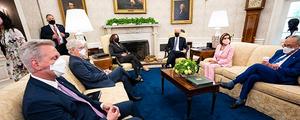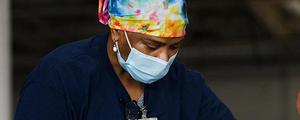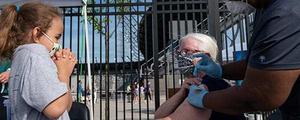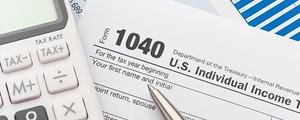Story Highlights
- 36% satisfied with way things are going in the U.S.
- Economic confidence falls back into negative territory
- The government and the coronavirus named most important problems
WASHINGTON, D.C. -- Americans' satisfaction with the way things are going in the U.S. is unchanged even as their confidence in the economy has shifted from slightly optimistic to slightly pessimistic.
Thirty-six percent of Americans in May are satisfied with the way things are going, the third consecutive month the figure has topped 30%. Though statistically similar to last month's 34%, the current level of satisfaction is the highest measured since the coronavirus pandemic began.
Satisfaction dropped to 11% around the time of the Jan. 6 Capitol Hill riots and the winter surge in U.S. coronavirus cases and deaths.

Line graph. 36% of U.S. adults are satisfied with the way things are going in the U.S. in May 2021, similar to the past three months but much improved from 11% in January. The current figure is higher than any other measured since the coronavirus pandemic began, but remains below the recent high of 45% from February 2020.
The relative stability in satisfaction measured in the May 3-18 Gallup survey contrasts with greater recent variation in U.S. economic confidence. Gallup's Economic Confidence Index is now -7, down from +2 in April and back to the level registered in March. The recent shifts in confidence may reflect public reaction to a stronger-than-anticipated jobs report in April, followed by a weaker-than-expected report in May.
Confidence remains well above the lowest point of the pandemic, -33 in April 2020, but far from the +41 measured in the last fully pre-pandemic reading, from February 2020.
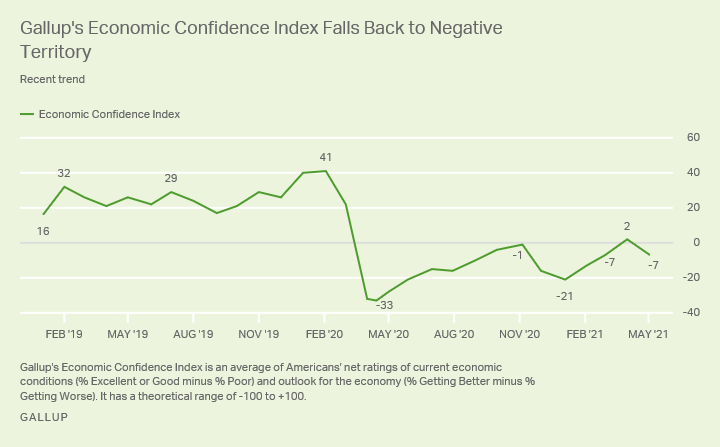
Line graph. Gallup's Economic Confidence Index is -7 for May 2021, returning to negative territory after registering a positive score for the first time during the pandemic in April. Confidence had been positive in recent years until the pandemic.
Gallup's Economic Confidence Index has a theoretical range of -100 to +100, and summarizes Americans' evaluations of current economic conditions and their assessments of whether the economy is getting better or worse.
Last month, Americans were more positive than negative on both measures, while their readings are net-negative on both this month. Twenty-seven percent of Americans now rate current economic conditions as excellent or good, while 30% rate them as poor. Meanwhile, 43% say the economy is getting better, and 53% say it is getting worse.
"Most Important Problem" Question Signals Greater Economic Concern
Greater concern about the economy is also apparent in the increased percentage of Americans mentioning an economic issue when asked to name the most important problem facing the U.S. Currently, 21% cite an economic issue -- such as the economy in general, unemployment or the federal budget deficit -- up from 14% in April and the highest since April 2017.
Even during the worst phases of the coronavirus pandemic, Americans' attention was focused more on the coronavirus and other issues as the most important problem, including times when economic confidence was much lower than today. Before the current survey, the highest percentage mentioning economic matters as the most important problem since the pandemic began was 19% in June.

Line graph. Mentions of economic issues as the most important U.S. problem are higher now, in May 2021, than at any point since April 2017. Before now, the high point since the coronavirus pandemic began was 19% in June 2020.
No single economic issue, however, ranks among the top problems Americans name as most important today. The current top problems are government (16%), the coronavirus pandemic (15%), immigration (12%), and race relations or racism (11%). The most-commonly mentioned economic issue is the economy in general terms, at 7%, followed by unemployment or jobs at 5%.
Mentions of the coronavirus pandemic as the most important problem are the lowest since a 13% reading in early March 2020, before then-President Donald Trump declared a national emergency over it. A month later, a high of 45% cited the coronavirus as the most important problem.
Democrats Upbeat, Republicans Pessimistic About National Conditions
Americans' satisfaction with the state of the nation and their evaluation of the economy are heavily influenced by whether their party preference matches the party of the president. As such, with a Democratic president currently in office, Democrats are much more likely to rate national conditions positively than Republicans are.
-
Sixty-three percent of Democrats, 32% of independents and 8% of Republicans are satisfied with the way things are going in the U.S. The Democratic figure is highest for the party since November 2012 (64%), just before Barack Obama's reelection as president.
-
37% of Democrats rate current economic conditions as excellent or good, while 19% say they are poor. In contrast, 14% of Republicans rate current conditions positively and 48% negatively. Independents' assessments are equally positive (26%) and negative (27%).
-
Whereas two-thirds of Democrats say the economy is getting better, just 13% of Republicans agree. More than eight in 10 Republicans, 84%, believe the economy is getting worse. Independents are slightly more likely to say the economy is getting worse (50%) rather than getting better (44%).
-
These economic perceptions result in Economic Confidence Index scores of +27 for Democrats, -3 for independents and -52 for Republicans.
-
The decline in economic confidence this month occurred almost entirely among Republicans, with their score down from -35 a month ago. In April, the Economic Confidence Index among Democrats was +31, and it was +1 among independents.
-
Mentions of economic issues as the most important problem are up similarly among all party groups, including a seven-percentage-point increase among Republicans (to 24%), an eight-point increase among independents (to 22%), and a six-point increase among Democrats (to 18%).
Bottom Line
Americans' less-positive evaluations of the U.S. economy, and their growing concern about it, have not been enough to affect their satisfaction with the way things are going in the country in May. To some degree, this reflects satisfaction levels that were already low among Republicans and, to a lesser extent, independents. More significant declines in satisfaction may occur only if Democrats start to become pessimistic about national conditions. But Democrats appear to be happy with the current power structure in Washington, D.C., which has their party in control of the presidency and both houses of Congress for the first time since 2010.
Certainly, there is room for satisfaction and economic confidence to increase among all party groups, should the economy show definite signs of improvement. The May jobs report to be released in early June could go a long way to convince Americans whether the disappointing April report was a temporary aberration in the economic recovery or the start of a more concerning negative trend.
View complete question responses and trends (PDF download).
Learn more about how the Gallup Poll Social Series works.

